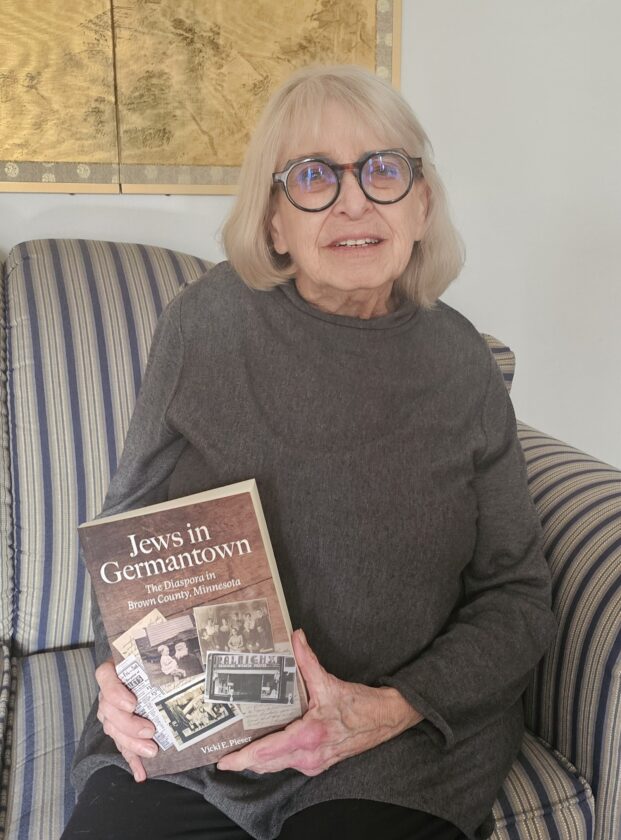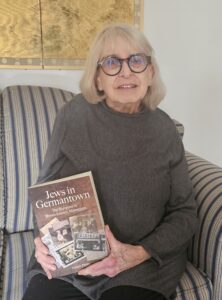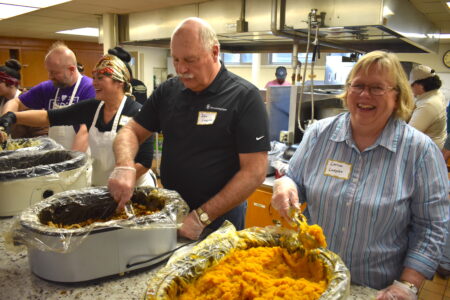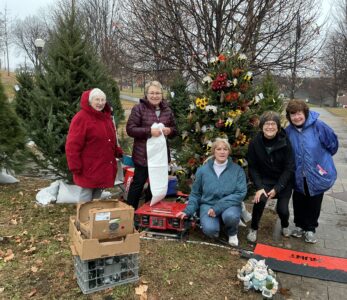‘Collecting little stories about people’
New book chronicals Brown County’s small-town Jewish life

Vicki Pieser holds her book 'Jews in Germantown' at her New Ulm home. ( Photo by Amy Zents)
NEW ULM — Vicki Pieser never set out to write a book about Brown County’s Jewish community.
“I was just collecting little stories about people,” she said. Over time, those stories grew into a full manuscript, now published as Jews in Germantown: The Diaspora in Brown County, Minnesota.
The book traces Jewish families in the region, highlighting immigrant experiences, small-town life, discrimination, and the complex work of preserving culture and tradition across generations.
One early catalyst for the project was a set of family letters. Among those she interviewed were descendants of two of the region’s most prominent early Jewish families: members of the Isaac family of Sleepy Eye, and Molly Salsberg, a granddaughter of the Salsberg family of New Ulm. Their recollections helped fill in personal details about storekeeping, community life and the small but enduring presence of Jewish families in Brown County.
The letters also described maintaining kosher homes and surviving financial struggles. “Survival was their main concern,” Pieser said.
These accounts, paired with letters preserved from Pieser’s own Czech family, showed how prejudice and persecution crossed borders and generations. Her mother grew up in Prague, and her father, from Belarus, also lived in Prague before immigrating. Their correspondence and family documents described the climate of rising hostility in Eastern Europe — early warning signs that foreshadowed the pogroms and, ultimately, the Holocaust.
The book opens with a stark image: three Jewish girls, each in a different town, each in a different decade, all pelted with stones on their way to school.
“It wasn’t just Europe,” Pieser said. “Prejudice showed up in small towns here too.”
The book spans from 1877 to the present, beginning with Simon Loewenthal, an immigrant from Bavaria who opened Cheap Charley’s — the first known Jewish-owned business in Brown County — in 1877.
While many Jewish families built retail shops, others worked as junk dealers, doctors, engineers, teachers, tailors, inventors, concert pianists, land developers, playwrights and sculptors.
Pieser herself grew up in Temple, Texas, and met her husband, Ben, at the University of Colorado.
“Nine months later, we were married,” she said.
They moved to New Ulm more than 50 years ago, where Ben’s parents, Richard and Sara Pieser, had founded New Ulm Furniture in 1945.
“Ben always wore a jacket,” Pieser recalled. “He stood up to shake hands, and he remembered what people bought 20 years earlier.”
They raised three children in New Ulm — Betsy and Joshua, who worked in the store, and Andrea, who lives in Seattle with her three children.
“We celebrated the Jewish holidays,” she said. “We made sure the kids knew who they were. Even if we were one of the few Jewish families in town, we kept the traditions alive. We made sure our children attended religious school in the Twin Cities.”
Many Jewish businesses remained active in Brown County well into the mid-20th century. Ben’s sister, Shellie Shamblott, opened a children’s store, The Carousel.
Ben Pieser continued operating New Ulm Furniture until it closed in 2021.
“They worked hard, they built relationships, and then one by one they were gone,” Pieser said.
Pieser credits multiple contributors for shaping the book. The manuscript was edited by Dr. Dan Groebner, with additional suggestions from historians Earl Schwartz and Dan Hoisington. Darla Gebhard’s deep knowledge of Brown County history and archival sources was essential to the project. Betsy Pieser served as product manager.
A book launch and signing will be held Dec. 6 from 11 a.m. to 1 p.m. at the Brown County Historical Society Museum, 2 N. Broadway, and again Feb. 5, 2026, from 5:30 to 6:30 p.m. at Lykke Books, 301 N. Minnesota St., New Ulm.
Jews in Germantown: The Diaspora in Brown County, Minnesota was made possible through a Minnesota Historical Society Legacy Grant and is available through the Jewish Historical Society of the Upper Midwest at jhsum.org.




